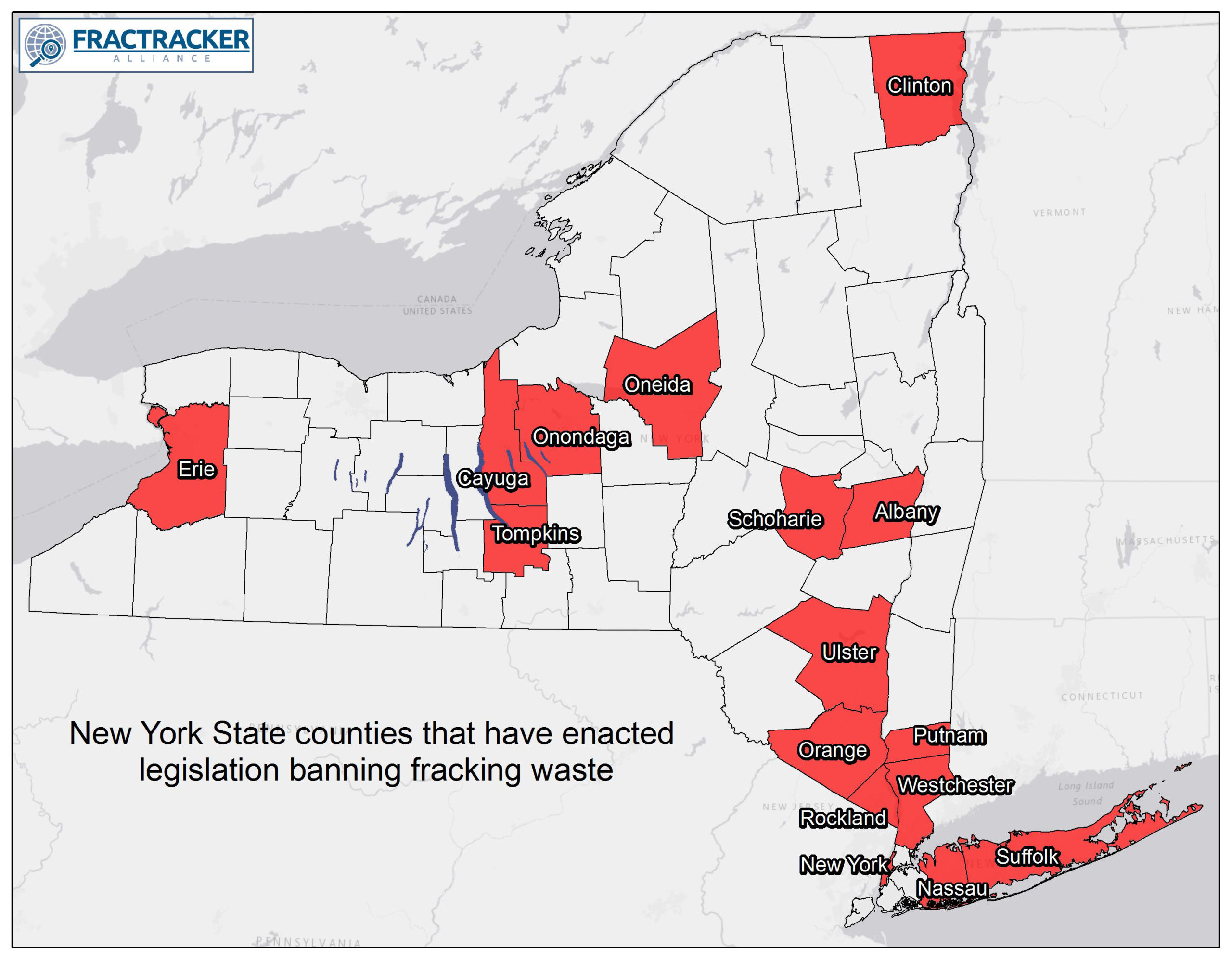Contact: Liz Moran (518) 610-1828, emoran@nypirg.org; Melissa Troutman (724) 388-0464, mtroutman@earthworks.org; Eric Weltman (617) 304-5330, eweltman@fwwatch.org
NEW ANALYSIS FINDS OIL AND GAS LIQUID WASTE CONTINUES TO BE USED ON ROADS DESPITE CLOSURE OF HAZARDOUS WASTE LOOPHOLE
On first day of winter, organizations call for New York to ban road spreading of oil and gas waste
(Albany, N.Y.) Today, a coalition of environmental organizations released an analysis revealing that, despite New York’s ban on fracking, oil and gas liquid waste is permitted for deicing of roads for 33 different cities, towns, and private entities. This practice is ongoing despite New York’s recently adopted law that closes a loophole that once exempted oil and gas waste from being classified as hazardous waste. Oil and gas waste is known to contain constituents that can make the waste toxic and radioactive.
The analysis also revealed that since 1988, the New York State Department of Environmental Conservation (DEC) has issued 119 permits for road spreading of oil and gas waste, and the practice has primarily been permitted in central and western New York.
In 2017, DEC revised regulations regarding oil and gas waste and prohibited road spreading of waste from the Marcellus shale; however, the regulations still allow for road spreading of liquids from other oil and gas drilling operations for the purposes of deicing, dust control, and road stabilization.1 Any waste generated through the extraction of oil or gas can contain a number of pollutants, such as toxic chemicals, metals, excess salts, and carcinogens like benzene and radioactive materials.2
In light of these hazards, 15 New York counties and New York City (see page 3 for map) have banned this practice; however, spreading is still approved in Erie County despite their ban (see page 4 for map of road spreading locations). Environmental advocates are calling for Governor Cuomo and the DEC to follow the lead of these counties and ban this practice statewide.
“The data is clear that all oil and gas waste can contain radioactive materials,” said Melissa Troutman, Research and Policy Analyst at Earthworks. “Until testing of ‘brine’ wastewater includes analysis for radioactive materials, all spreading of oil and gas wastewater on roads in New York State must cease.”
Senator Rachel May said, “This year, we were finally able to end the loophole for fracking waste in New York state and demand that it be subject to the same hazardous waste treatment as everything else. Central New York and Upstate are home to some of the world’s most important fresh water resources. It is unconscionable to use harmful and potentially radioactive waste to treat icy roads, where it will then flow directly into our waterways. I urge the Governor and the DEC to protect our water by banning this practice across the state.”
“New York has proven itself a champion of environmental protection and fighting climate change. However, the waste that comes from oil and gas extraction still being used to treat our roads during the winter months can contain hundreds of carcinogenic and radioactive chemicals that can seep into fragile ecosystems and could even contaminate our drinking water. That’s why Albany County banned the practice years ago, with a vote that crossed party lines,” said Albany County Executive Daniel P. McCoy. “It’s time for the State to follow the science and follow suit to protect public health and our natural resources for future generations.”
Liz Moran, Environmental Policy Director for NYPIRG, said, “Road spreading of oil and gas waste has gone on in New York for far too long. It is well established that oil and gas waste contains contaminants that will leave, and likely already have, lasting damages on New York’s environment. New York made the right move to ban fracking – now those efforts must be matched with a ban on the dangerous practice of oil and gas waste road spreading.”
“New Yorkers shouldn’t be driving on toxic, radioactive oil and gas industry waste,” said Eric Weltman of Food & Water Watch. “Oil and gas waste threatens clean water and public health. Governor Cuomo should stop these permits and end this dangerous practice one and for all.”
“The scientific and medical community have documented and warned that waste from oil and gas drilling and storage sites contains toxic and radioactive pollutants that can bioaccumulate in the environment and in humans,” said Ellen Weininger, Director of Educational Outreach at Grassroots Environmental Education. “Road spreading of this waste for de-icing and dust suppression is a dangerous practice that should no longer be permitted by the NYS DEC. We strongly urge an immediate ban on road spreading oil and gas waste to protect our vulnerable water sources, agricultural lands and residents from certain contamination.”
“Toxic chemicals, metals, and known carcinogens have been found in waste produced through the extraction of oil and natural gas,” said Liz Ahearn, Conservation Analyst, Sierra Club Atlantic Chapter. “The spreading of this waste on roads poses major threats to water quality, public health, ecosystems, and the environment. The NYS DEC should immediately stop issuing permits allowing the spreading of oil and gas waste on our roads.”
 |
 |
_________________
1 NYS DEC, “DEC Strengthens State’s Solid Waste Regulations,” September 20, 2017, https://www.dec.ny.gov/press/111459.html
2 Robert B. Jackson et al., The Environmental Costs and Benefits of Fracking, 39 ENVIRONMENT AND RESOURCES 327 (2014); U.S. GEOLOGICAL SURVEY, RADIUM CONTENT OF OIL AND GAS FIELD PRODUCED WATERS IN THE NORTHERN APPALACHIAN BASIN (USA): SUMMARY AND DISCUSSION OF DATA (2011), available at http://pubs.usgs.gov/sir/2011/5135/.


